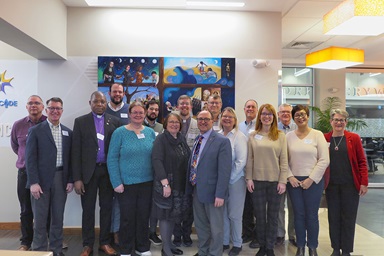An amendment offered during debate on socially responsible investing that sought to divest from illegal settlements on occupied lands failed 559-167. But General Conference delegates on May 20 adopted a petition on behalf of a Palestinian village, Wadi Foquin.
Earlier during General Conference, the Finance and Administration Legislative Committee failed to support any petition calling for divestment from companies doing business in Israel.
Speaking for the amendment, Janice Nelson, a lay delegate from the Oregon-Idaho Conference, said that staying at the table and pleading with companies to be socially responsible is not working.
“There are companies that are invested in profiting from the occupation of Palestine that we have been talking to for many, many years,” Nelson said. “I would not ask us to divest from anybody until we had done the shareholder advocacy, but that has gone on and on with no results. It’s time to say that we do not profit from the occupation of another people’s lands, which is exactly what is going on. This is not anti-Israel; it’s not anti-Jewish; it’s anti-occupation.”
The Rev. Alex Joyner, a reserve delegate from the Virginia Conference, said that divestment is unfair to Israel as it targets one party as a “bad actor” in the situation.
“Divestment is built on the notion that Israel alone is responsible for the situation of the occupation, and that Israel, alone, can end it,” Joyner said.
He said that the occupation is a deeply troubling reality and it must end, “but targeting settlements for divestment doesn’t address all of the issues that will lead to peace, including security concerns, the right of return, the status of Jerusalem and the question of borders for a free and independent Palestine.”
Delegates also adopted an amended petition on behalf of a Palestinian village, Wadi Foquin, where United Methodists support an Advance project and community development site.
The petition calls on General Conference to send a letter to U.S. Secretary of State John Kerry and other State Department officials, U.S. President Barack Obama, the U.S. Consulate in Jerusalem and the Israeli Civil Authority to express “our concerns over the confiscation of land and destruction of life in the village.”
While the petition demands accountability from the Israeli government, the approved amendment deleted a call to withhold foreign aid “until accountability is in place and human rights are restored.”
Erik Alsgaard is a communicator for the Baltimore-Washington Conference. Kathy Gilbert, a United Methodist News Service reporter, contributed to this story.
News Media Contact: Vicki Brown at (615)742-5470 or [email protected]
Like what you're reading? Support the ministry of UM News! Your support ensures the latest denominational news, dynamic stories and informative articles will continue to connect our global community. Make a tax-deductible donation at ResourceUMC.org/GiveUMCom.



